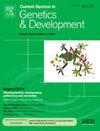Lineage-specific regulatory evolution: insights from massively parallel reporter assays
IF 3.6
2区 生物学
Q2 CELL BIOLOGY
引用次数: 0
Abstract
Lineage-specific genetic variants play a key role in evolutionary divergence, particularly through changes in cis-regulatory elements that fine-tune gene expression. Massively parallel reporter assays (MPRAs) provide a powerful approach to characterize these variants at scale. This review highlights how MPRAs have been used to study lineage-specific regulatory activity in enhancer elements, including human accelerated regions, human adaptive quickly evolving regions, and short human-specific conserved deletions. We discuss the effects of enhancer variation on traits distinguishing modern humans, archaic hominins, and primates, as well as how MPRAs disentangle cis- and trans-regulatory contributions to gene expression divergence. As MPRA technology advances, integrating it with CRISPR-based validation and artificial intelligence–driven predictions will further illuminate the role of lineage-specific regulatory evolution.
谱系特异性调控进化:来自大规模平行报告者分析的见解
谱系特异性遗传变异在进化分化中起着关键作用,特别是通过顺式调控元件的变化来微调基因表达。大规模并行报告分析(MPRAs)提供了一种强大的方法来大规模地表征这些变体。这篇综述强调了MPRAs如何被用于研究增强子元件的谱系特异性调控活性,包括人类加速区、人类适应性快速进化区和人类特异性短保守缺失。我们讨论了增强子变异对区分现代人、古人类和灵长类动物的性状的影响,以及MPRAs如何理清顺式和反式调控对基因表达差异的贡献。随着MPRA技术的进步,将其与基于crispr的验证和人工智能驱动的预测相结合,将进一步阐明谱系特异性调控进化的作用。
本文章由计算机程序翻译,如有差异,请以英文原文为准。
求助全文
约1分钟内获得全文
求助全文
来源期刊
CiteScore
7.90
自引率
0.00%
发文量
102
审稿时长
1 months
期刊介绍:
Current Opinion in Genetics and Development aims to stimulate scientifically grounded, interdisciplinary, multi-scale debate and exchange of ideas. It contains polished, concise and timely reviews and opinions, with particular emphasis on those articles published in the past two years. In addition to describing recent trends, the authors are encouraged to give their subjective opinion of the topics discussed.
In Current Opinion in Genetics and Development we help the reader by providing in a systematic manner:
1. The views of experts on current advances in their field in a clear and readable form.
2. Evaluations of the most interesting papers, annotated by experts, from the great wealth of original publications.[...]
The subject of Genetics and Development is divided into six themed sections, each of which is reviewed once a year:
• Cancer Genomics
• Genome Architecture and Expression
• Molecular and genetic basis of disease
• Developmental mechanisms, patterning and evolution
• Cell reprogramming, regeneration and repair
• Genetics of Human Origin / Evolutionary genetics (alternate years)

 求助内容:
求助内容: 应助结果提醒方式:
应助结果提醒方式:


